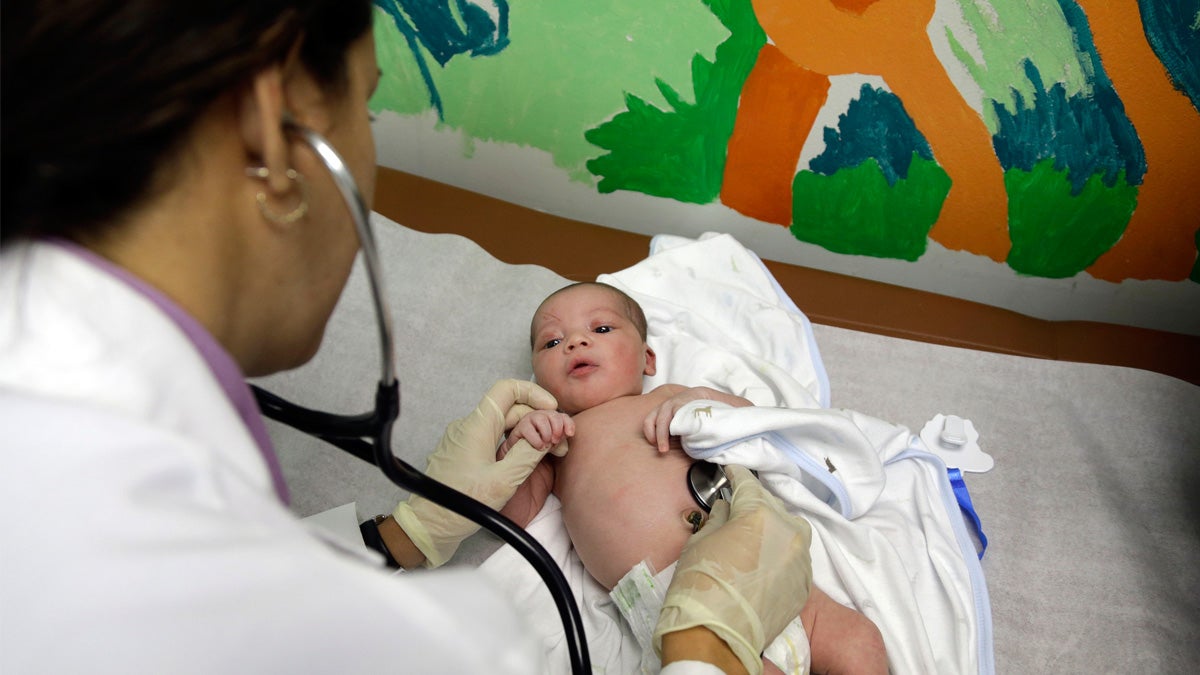Hospitals encouraging expectant moms to carry babies to full term

(Lynne Sladky, AP Photo, file)
Maternity wards across the region are learning to stave off early deliveries that aren’t medically necessary.
For years now, national groups and hospitals across the Delaware Valley have been looking for ways to avoid elective early deliveries.
Babies do best when they are born after the 39th or 40th week of pregnancy, said Helen Kuroki an obstetrician-gynecologist at Riddle Hospital in Delaware County.
Infants born even a week or two earlier, however, are more likely to need close monitoring. Kuroki says those babies sometimes can’t breathe or eat on their own, or they struggle to maintain a normal body temperature.
“We are also identifying over time that those babies may have cognitive difficulties that are very mild but may impact that baby over a lifetime,” Kuroki said.
In Riddle’s maternity ward, the staff have a “safety huddle” twice a day. In that meeting, doctors and nurses make sure there’s true medical reason to jump-start a birth or offer an early cesarean section.
“When a patient asks us, ‘Can I have a delivery a week or two or three before? My mother’s coming in to town or I’m uncomfortable — or I’d really just like this pregnancy to be over,’ at that point we have a discussion,” Kuroki said.
At Thomas Jefferson University Hospital, nurse practitioner Deborah Cruz has lots of similar discussions with expecting moms. Those can be difficult conversations, but she said she gets ammunition for those talks from a list compiled by the Association of Women’s Health Obstetric Nursing, called “Go the full 40.”
Jefferson also is trying to change the behavior of doctors and other health providers who book their patients for a delivery at the hospital.
“There’s this form that they need to fill out,” Cruz said. “If it’s not complete or there are any concerns about should this patient should be scheduled or not, it goes back to the provider before it can be scheduled.”
In another move to discourage elective deliveries, last year, several national doctors groups adopted new terminology to underscore the idea that “full term” pregnancy is between 39 and 40 weeks.
This month, a group of hospitals across the Philadelphia region reported the hospitals drove some already low elective early delivery rates even lower.
The participating hospitals in the Southeastern Pennsylvania collaborative included Jefferson and Hahnemann University Hospital. Some of the biggest, busiest medical centers in the region were not part of the hospital association’s working group.
There have been several efforts to get hospitals to report their elective early delivery rates. For a survey compiled by the Leapfrog Group, most hospitals in the Philadelphia region “declined to respond.”
The federal government — through the Centers for Medicare & Medicaid Services — has also asked hospitals to volunteer their rates. Some experts expect a hospital’s elective early delivery rate to become a safety measure and a reporting requirement in the future.
WHYY is your source for fact-based, in-depth journalism and information. As a nonprofit organization, we rely on financial support from readers like you. Please give today.

